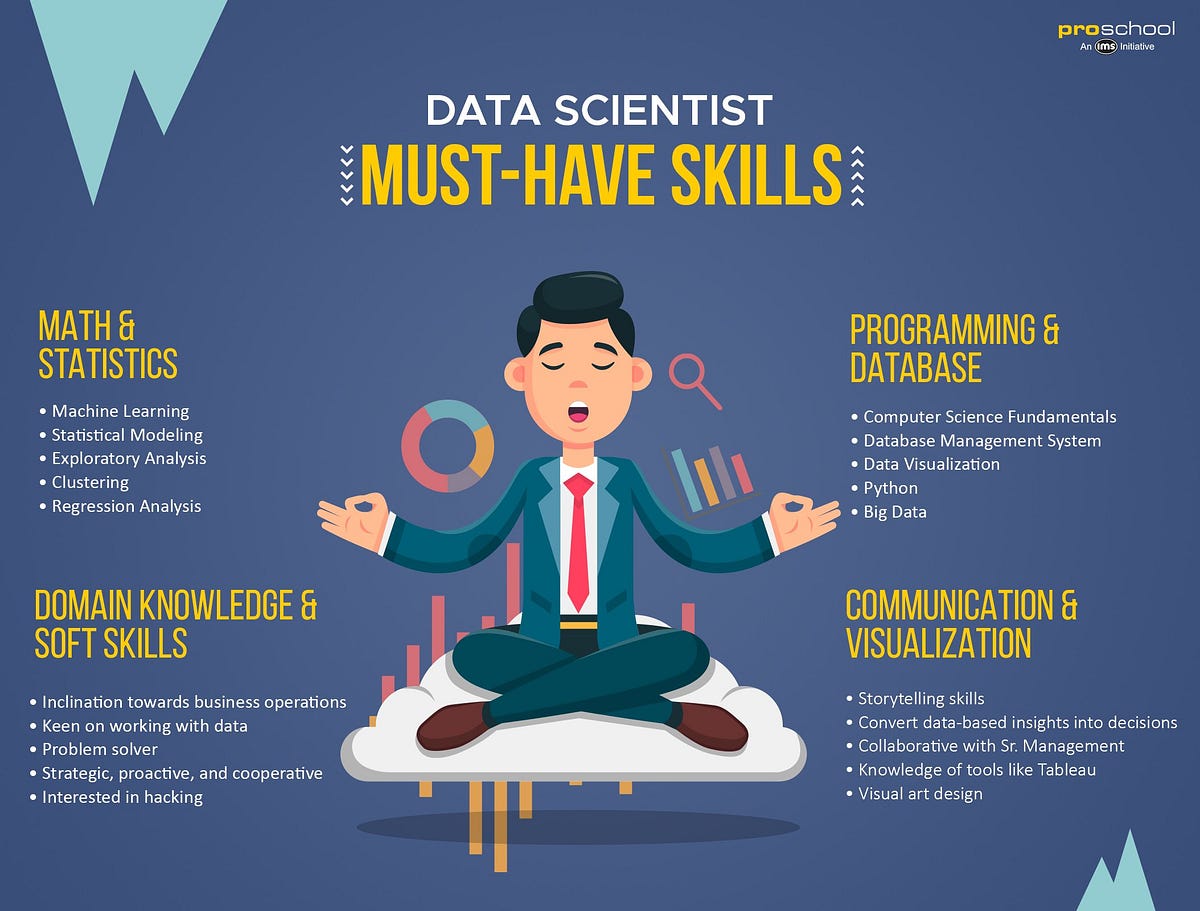Exploring the Impact of Uniform vs. Specialized Job Titles in Data Science Teams

In data science and machine learning, organizations are continually refining their team structures to maximize efficiency, innovation, and collaboration. One critical aspect of team formation that often sparks debate is the assignment of job titles, especially in teams comprising both software engineers (SWEs) and machine learning (ML) researchers. The question at hand is whether these team members should be given distinct job titles reflecting their specialized roles or uniform titles that promote a sense of equality and unity within the team.
This article delves deep into the implications of job title assignments in data science teams, exploring the arguments for and against uniform and distinct titles. We will examine how job titles influence team dynamics, individual motivation, career development, and the overall success of projects. By analyzing organizational culture, team composition, and employee preferences, we aim to provide a comprehensive guide to help organizations make informed decisions that align with their strategic goals and foster a productive work environment.
author_profile: false categories:
- Data Science
- Team Management
- Organizational Behavior classes: wide date: ‘2024-09-19’ excerpt: Discover the implications of assigning different job titles in data science teams, examining how uniform or specialized titles affect team unity, role clarity, and individual motivation. header: image: /assets/images/data_team.png og_image: /assets/images/data_science_5.jpg overlay_image: /assets/images/data_team.png show_overlay_excerpt: false teaser: /assets/images/data_team.png twitter_image: /assets/images/data_science_5.jpg keywords:
- Data science teams
- Job titles
- Team dynamics
- Software engineers
- Machine learning researchers
- Team collaboration
- Organizational culture
- Career development
- Employee motivation
- Team management seo_description: Explore the pros and cons of assigning uniform versus specialized job titles in data science teams. Learn how job titles impact team dynamics, collaboration, and organizational success. seo_title: ‘Uniform vs. Specialized Job Titles in Data Science Teams: Impact and Best Practices’ seo_type: article subtitle: Exploring the Impact of Uniform vs. Specialized Job Titles in Data Science Teams summary: This article explores the debate on whether data science teams should assign uniform or specialized job titles to team members such as software engineers and machine learning researchers. It examines the arguments for and against both approaches, considering factors like team unity, role clarity, individual motivation, and organizational culture. By analyzing the impact of job titles on team dynamics and performance, the article provides recommendations to help organizations make informed decisions that align with their strategic goals and foster a productive work environment. tags:
- Data science teams
- Job titles
- Team dynamics
- Software engineering
- Machine learning research
- Organizational culture
- Team collaboration
- Human resources
- Career development
- Employee motivation title: ‘The Great Title Debate: Should Data Science Teams Assign Different Job Titles to Specialized Roles?’ toc: false —
Arguments for Uniform Job Titles
Assigning the same job titles to all team members, regardless of their specialization, is a strategy some organizations adopt to promote a cohesive team environment. Here are the key arguments supporting this approach:
1. Promoting Team Unity
Uniform job titles can foster a sense of equality among team members. When everyone is referred to as a “Data Scientist” or “Machine Learning Engineer,” it minimizes perceived hierarchies or divisions based on specialization.
- Enhanced Collaboration: Team members may be more inclined to share knowledge and assist each other without the constraints of hierarchical barriers.
- Shared Responsibility: Uniform titles can encourage a collective sense of ownership over projects, with team members feeling equally accountable for outcomes.
2. Reducing Class Distinctions
Differentiated titles can inadvertently create classes within a team, leading to divisions or feelings of inequity.
- Avoiding Elitism: Uniform titles prevent the perception that one role is more prestigious or valuable than another.
- Inclusivity: This approach promotes an inclusive environment where all contributions are equally recognized.
3. Flexibility in Roles
Uniform titles allow team members to wear multiple hats and contribute beyond their primary expertise.
- Cross-Functional Skills: Team members may be more willing to develop skills outside their specialization, leading to a more versatile team.
- Adaptability: In dynamic project environments, roles may overlap, and having flexible titles can facilitate seamless transitions between tasks.
4. Simplified Organizational Structure
A streamlined set of job titles can simplify HR processes, organizational charts, and communication within and outside the team.
- Ease of Management: Fewer job titles can make performance evaluations, promotions, and salary bands more straightforward.
- Clarity for Stakeholders: External stakeholders or collaborators may find it easier to understand team roles without navigating a complex hierarchy of titles.
author_profile: false categories:
- Data Science
- Team Management
- Organizational Behavior classes: wide date: ‘2024-09-19’ excerpt: Discover the implications of assigning different job titles in data science teams, examining how uniform or specialized titles affect team unity, role clarity, and individual motivation. header: image: /assets/images/data_team.png og_image: /assets/images/data_science_5.jpg overlay_image: /assets/images/data_team.png show_overlay_excerpt: false teaser: /assets/images/data_team.png twitter_image: /assets/images/data_science_5.jpg keywords:
- Data science teams
- Job titles
- Team dynamics
- Software engineers
- Machine learning researchers
- Team collaboration
- Organizational culture
- Career development
- Employee motivation
- Team management seo_description: Explore the pros and cons of assigning uniform versus specialized job titles in data science teams. Learn how job titles impact team dynamics, collaboration, and organizational success. seo_title: ‘Uniform vs. Specialized Job Titles in Data Science Teams: Impact and Best Practices’ seo_type: article subtitle: Exploring the Impact of Uniform vs. Specialized Job Titles in Data Science Teams summary: This article explores the debate on whether data science teams should assign uniform or specialized job titles to team members such as software engineers and machine learning researchers. It examines the arguments for and against both approaches, considering factors like team unity, role clarity, individual motivation, and organizational culture. By analyzing the impact of job titles on team dynamics and performance, the article provides recommendations to help organizations make informed decisions that align with their strategic goals and foster a productive work environment. tags:
- Data science teams
- Job titles
- Team dynamics
- Software engineering
- Machine learning research
- Organizational culture
- Team collaboration
- Human resources
- Career development
- Employee motivation title: ‘The Great Title Debate: Should Data Science Teams Assign Different Job Titles to Specialized Roles?’ toc: false —
Considerations for Decision-Making
When deciding on job titles for a data science team, organizations should consider several factors to make an informed choice that aligns with their objectives and culture.
Organizational Culture
The company’s culture and values play a significant role in determining the appropriate approach to job titles.
- Flat Hierarchies: Organizations that value flat structures and egalitarian principles may prefer uniform titles to promote a collaborative environment.
- Traditional Structures: Companies with established hierarchies and clear chains of command might lean towards distinct titles to maintain order and clarity.
Team Composition and Goals
The nature of the projects and the composition of the team can influence the effectiveness of uniform or distinct titles.
- Project Complexity: Teams working on highly specialized or complex projects may benefit from clearly defined roles to ensure expertise is appropriately applied.
- Interdisciplinary Teams: In teams where roles frequently overlap, uniform titles might facilitate better teamwork and adaptability.
Employee Preferences
Understanding how team members feel about their titles is crucial for maintaining morale and motivation.
- Professional Pride: Individuals may take pride in titles that reflect their specialized skills and may feel undervalued without this recognition.
- Career Aspirations: Employees with clear career goals in their field might prefer distinct titles that align with their professional development plans.
External Perceptions
How clients, partners, and the broader industry perceive your team can be influenced by job titles.
- Client Confidence: Clients may feel more confident when specialists with recognized titles are working on their projects.
- Industry Reputation: Using industry-standard titles can enhance the organization’s reputation and credibility.
Legal and Compliance Factors
In some cases, legal considerations may impact job title decisions.
- Regulatory Requirements: Certain industries have regulations that dictate qualifications and titles for specific roles.
- Labor Laws: Compliance with labor laws regarding job classifications and associated compensation is essential.
author_profile: false categories:
- Data Science
- Team Management
- Organizational Behavior classes: wide date: ‘2024-09-19’ excerpt: Discover the implications of assigning different job titles in data science teams, examining how uniform or specialized titles affect team unity, role clarity, and individual motivation. header: image: /assets/images/data_team.png og_image: /assets/images/data_science_5.jpg overlay_image: /assets/images/data_team.png show_overlay_excerpt: false teaser: /assets/images/data_team.png twitter_image: /assets/images/data_science_5.jpg keywords:
- Data science teams
- Job titles
- Team dynamics
- Software engineers
- Machine learning researchers
- Team collaboration
- Organizational culture
- Career development
- Employee motivation
- Team management seo_description: Explore the pros and cons of assigning uniform versus specialized job titles in data science teams. Learn how job titles impact team dynamics, collaboration, and organizational success. seo_title: ‘Uniform vs. Specialized Job Titles in Data Science Teams: Impact and Best Practices’ seo_type: article subtitle: Exploring the Impact of Uniform vs. Specialized Job Titles in Data Science Teams summary: This article explores the debate on whether data science teams should assign uniform or specialized job titles to team members such as software engineers and machine learning researchers. It examines the arguments for and against both approaches, considering factors like team unity, role clarity, individual motivation, and organizational culture. By analyzing the impact of job titles on team dynamics and performance, the article provides recommendations to help organizations make informed decisions that align with their strategic goals and foster a productive work environment. tags:
- Data science teams
- Job titles
- Team dynamics
- Software engineering
- Machine learning research
- Organizational culture
- Team collaboration
- Human resources
- Career development
- Employee motivation title: ‘The Great Title Debate: Should Data Science Teams Assign Different Job Titles to Specialized Roles?’ toc: false —
Recommendations
After considering the arguments and examples, organizations can follow these steps to make an informed decision:
1. Assess Organizational Goals
Determine what you want to achieve with your team structure and how job titles will impact those objectives.
- Strategic Alignment: Ensure that the decision on job titles supports the organization’s strategic goals and project needs.
- Cultural Fit: Reflect on whether the approach aligns with the company’s culture and values.
2. Consult with Team Members
Engage with your team to understand their perspectives and preferences regarding job titles.
- Surveys and Feedback: Use anonymous surveys or open discussions to gather honest opinions.
- Individual Meetings: Speak with team members individually to understand their career aspirations.
3. Consider a Hybrid Approach
A hybrid model can offer the benefits of both uniform and distinct job titles.
- Official Uniform Titles: Use a standard title for external communications and organizational charts.
- Internal Role Descriptors: Internally, use role descriptors or levels to acknowledge specific responsibilities and expertise.
4. Focus on Role Clarity
Regardless of job titles, ensure that roles and responsibilities are clearly defined and communicated.
- Job Descriptions: Maintain detailed job descriptions that outline expectations and duties.
- Onboarding and Training: Provide comprehensive onboarding and ongoing training to reinforce role clarity.
5. Promote Collaboration and Recognition
Implement practices that encourage teamwork and recognize individual contributions.
- Team Building Activities: Foster relationships among team members to enhance collaboration.
- Recognition Programs: Acknowledge both team successes and individual achievements.
6. Regularly Reevaluate
Periodically assess whether the chosen approach continues to meet the team’s and organization’s needs.
- Performance Metrics: Monitor team performance and adjust as necessary.
- Employee Satisfaction: Keep track of morale and make changes if dissatisfaction arises.
author_profile: false categories:
- Data Science
- Team Management
- Organizational Behavior classes: wide date: ‘2024-09-19’ excerpt: Discover the implications of assigning different job titles in data science teams, examining how uniform or specialized titles affect team unity, role clarity, and individual motivation. header: image: /assets/images/data_team.png og_image: /assets/images/data_science_5.jpg overlay_image: /assets/images/data_team.png show_overlay_excerpt: false teaser: /assets/images/data_team.png twitter_image: /assets/images/data_science_5.jpg keywords:
- Data science teams
- Job titles
- Team dynamics
- Software engineers
- Machine learning researchers
- Team collaboration
- Organizational culture
- Career development
- Employee motivation
- Team management seo_description: Explore the pros and cons of assigning uniform versus specialized job titles in data science teams. Learn how job titles impact team dynamics, collaboration, and organizational success. seo_title: ‘Uniform vs. Specialized Job Titles in Data Science Teams: Impact and Best Practices’ seo_type: article subtitle: Exploring the Impact of Uniform vs. Specialized Job Titles in Data Science Teams summary: This article explores the debate on whether data science teams should assign uniform or specialized job titles to team members such as software engineers and machine learning researchers. It examines the arguments for and against both approaches, considering factors like team unity, role clarity, individual motivation, and organizational culture. By analyzing the impact of job titles on team dynamics and performance, the article provides recommendations to help organizations make informed decisions that align with their strategic goals and foster a productive work environment. tags:
- Data science teams
- Job titles
- Team dynamics
- Software engineering
- Machine learning research
- Organizational culture
- Team collaboration
- Human resources
- Career development
- Employee motivation title: ‘The Great Title Debate: Should Data Science Teams Assign Different Job Titles to Specialized Roles?’ toc: false —
Final Thoughts
As data science continues to integrate deeper into various industries, the composition and management of data science teams will remain a critical topic. Job titles are more than just labels; they reflect how organizations value and structure their human capital. By approaching this issue with care and strategic thinking, companies can harness the full potential of their teams, fostering environments where both software engineers and machine learning researchers thrive and collaborate to achieve common goals.



